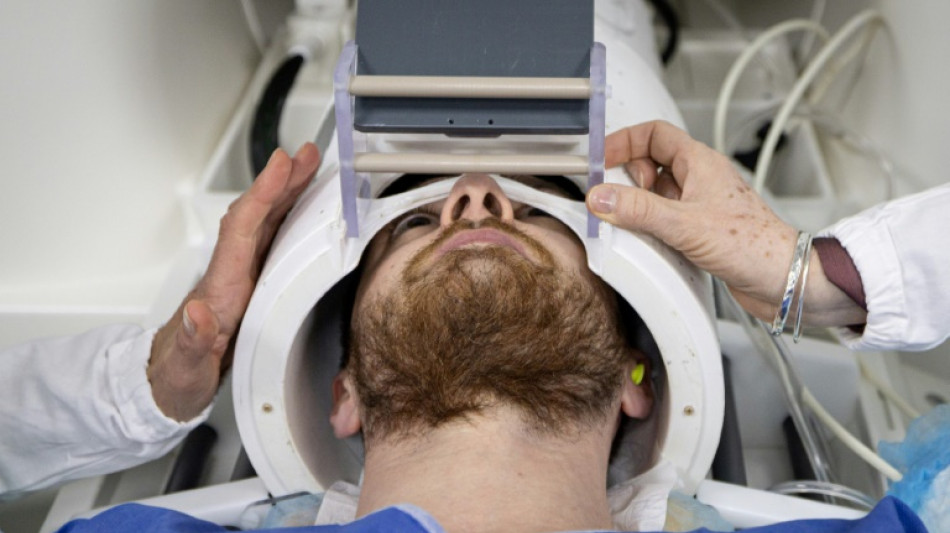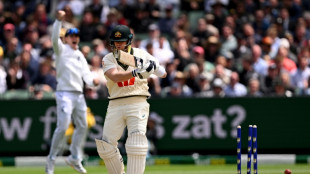
-
 Salah helps Egypt beat South Africa and book last-16 place
Salah helps Egypt beat South Africa and book last-16 place
-
Australia's Ikitau facing lengthy lay-off after shoulder injury

-
 Another 1,100 refugees cross into Mauritania from Mali: UN
Another 1,100 refugees cross into Mauritania from Mali: UN
-
Guardiola proud of Man City players' response to weighty issues

-
 Deadly blast hits mosque in Alawite area of Syria's Homs
Deadly blast hits mosque in Alawite area of Syria's Homs
-
The Jukebox Man on song as Redknapp records 'dream' King George win

-
 Liverpool boss Slot says Ekitike reaping rewards for greater physicality
Liverpool boss Slot says Ekitike reaping rewards for greater physicality
-
Judge jails ex-Malaysian PM Najib for 15 more years after new graft conviction

-
 Musona rescues Zimbabwe in AFCON draw with Angola
Musona rescues Zimbabwe in AFCON draw with Angola
-
Zelensky to meet Trump in Florida on Sunday

-
 'Personality' the key for Celtic boss Nancy when it comes to new signings
'Personality' the key for Celtic boss Nancy when it comes to new signings
-
Arteta eager to avoid repeat of Rice red card against Brighton

-
 Nigeria signals more strikes likely in 'joint' US operations
Nigeria signals more strikes likely in 'joint' US operations
-
Malaysia's former PM Najib convicted in 1MDB graft trial

-
 Elusive wild cat feared extinct rediscovered in Thailand
Elusive wild cat feared extinct rediscovered in Thailand
-
Japan govt approves record budget, including for defence

-
 Seoul to ease access to North Korean newspaper
Seoul to ease access to North Korean newspaper
-
History-maker Tongue wants more of the same from England attack

-
 Australia lead England by 46 after 20 wickets fall on crazy day at MCG
Australia lead England by 46 after 20 wickets fall on crazy day at MCG
-
Asia markets edge up as precious metals surge

-
 Twenty wickets fall on day one as Australia gain edge in 4th Ashes Test
Twenty wickets fall on day one as Australia gain edge in 4th Ashes Test
-
'No winner': Kosovo snap poll unlikely to end damaging deadlock

-
 Culture being strangled by Kosovo's political crisis
Culture being strangled by Kosovo's political crisis
-
Main contenders in Kosovo's snap election

-
 Australia all out for 152 as England take charge of 4th Ashes Test
Australia all out for 152 as England take charge of 4th Ashes Test
-
Boys recount 'torment' at hands of armed rebels in DR Congo

-
 Inside Chernobyl, Ukraine scrambles to repair radiation shield
Inside Chernobyl, Ukraine scrambles to repair radiation shield
-
Bondi victims honoured as Sydney-Hobart race sets sail

-
 North Korea's Kim orders factories to make more missiles in 2026
North Korea's Kim orders factories to make more missiles in 2026
-
Palladino's Atalanta on the up as Serie A leaders Inter visit

-
 Hooked on the claw: how crane games conquered Japan's arcades
Hooked on the claw: how crane games conquered Japan's arcades
-
Shanghai's elderly waltz back to the past at lunchtime dance halls

-
 Japan govt approves record 122 trillion yen budget
Japan govt approves record 122 trillion yen budget
-
US launches Christmas Day strikes on IS targets in Nigeria

-
 Australia reeling on 72-4 at lunch as England strike in 4th Ashes Test
Australia reeling on 72-4 at lunch as England strike in 4th Ashes Test
-
Too hot to handle? Searing heat looming over 2026 World Cup

-
 Packers clinch NFL playoff spot as Lions lose to Vikings
Packers clinch NFL playoff spot as Lions lose to Vikings
-
Guinea's presidential candidates hold final rallies before Sunday's vote

-
 Calvin B. Taylor Bankshares, Inc. Reports Third Quarter Financial Results and Announces New Stock Repurchase Program
Calvin B. Taylor Bankshares, Inc. Reports Third Quarter Financial Results and Announces New Stock Repurchase Program
-
Processa Pharmaceuticals and 60 Degrees Pharmaceuticals Interviews to Air on the RedChip Small Stocks, Big Money(TM) Show on Bloomberg TV

-
 Aptevo Therapeutics Announces 1-for-18 Reverse Stock Split
Aptevo Therapeutics Announces 1-for-18 Reverse Stock Split
-
Loar Holdings Inc. Announced The Completion of its Acquisition of LMB Fans & Motors

-
 IRS Can Freeze Installment Agreements After Missed Filings - Clear Start Tax Explains Why Compliance Comes First
IRS Can Freeze Installment Agreements After Missed Filings - Clear Start Tax Explains Why Compliance Comes First
-
How the Terms of SMX's $111 Million Capital Facility Shape the Valuation Discussion

-
 A Christmas Message to the DEA's Diversion Anti Marijuana Cabal
A Christmas Message to the DEA's Diversion Anti Marijuana Cabal
-
QAT Community Sets QuantumTrade 5.0 for Public Beta Testing in March 2026

-
 BondwithPet Expands B2B Offering with Custom Pet Memorial Product
BondwithPet Expands B2B Offering with Custom Pet Memorial Product
-
Best Crypto IRA Companies (Rankings Released)

-
 Eon Prime Intelligent Alliance Office Unveils New Brand Identity and Completes Website Upgrade
Eon Prime Intelligent Alliance Office Unveils New Brand Identity and Completes Website Upgrade
-
Villa face Chelsea test as Premier League title race heats up

| SCS | 0.12% | 16.14 | $ | |
| CMSC | 0.9% | 23.23 | $ | |
| RYCEF | 0.06% | 15.54 | $ | |
| RBGPF | 0% | 81.26 | $ | |
| RELX | -0.24% | 40.99 | $ | |
| GSK | -0.03% | 48.945 | $ | |
| NGG | 0.06% | 77.535 | $ | |
| RIO | 1.63% | 82.23 | $ | |
| VOD | -0.19% | 13.075 | $ | |
| BCE | 0.09% | 23.03 | $ | |
| CMSD | -0.04% | 23.13 | $ | |
| JRI | 0.11% | 13.485 | $ | |
| BCC | -0.01% | 74.705 | $ | |
| BTI | -0.1% | 57.185 | $ | |
| BP | -0.51% | 34.135 | $ | |
| AZN | 0.17% | 92.61 | $ |

Low-cost MRI paired with AI produces high-quality results
A magnetic resonance imaging device built with off-the-shelf parts and paired with AI matched the performance of high-end MRI machines, according to a study published Thursday that could pave the way for greater access to the life-saving tools.
First introduced five decades ago, MRI scanners are now a cornerstone of modern medicine, vital for diagnosing a wide range of conditions -- including strokes, tumors, and spinal conditions -- while avoiding exposing patients to radiation.
But they remain hard to come by in developing countries: Africa has less than one MRI machine per million people, while the figures in the United States and Japan are 40 and 55 per million, respectively.
To tackle the problem, Yujiao Zhao and colleagues at the University of Hong Kong built a simplified, low-powered MRI machine using store-bought hardware that cost around $22,000, and published their findings in the prestigious journal Science.
MRI uses a strong magnetic field and radio waves to align and manipulate the body's hydrogen atoms, producing detailed images of internal structures and organs.
The strength of magnets is measured in units called teslas (T), with conventional MRIs requiring powerful electromagnets that have wires bathed in supercooled liquid helium to generate magnetic fields of 1.5T to 7T.
These machines demand high electricity inputs, far exceeding what standard wall outlets can provide, and must be housed in radio frequency-shielded rooms to prevent equipment interference. Current clinical use MRIs cost upwards of million dollars.
By contrast, the Hong Kong research team's full body MRI machine used a helium-free 0.05T magnet and required just 1800 watts -- comparable to a hair dryer, meaning it could use a standard socket. What's more, it did not require radio shielding.
To compensate for the reduced image detail and higher levels of radio interference, the researchers integrated their system with a deep learning algorithm trained on a vast dataset of high-resolution images of human anatomical structures.
They then tested their machine on 30 healthy adult volunteers, performing scans over their bodies from their brains down to their knees.
The results from their so-called "ultra low field" MRI were found to be on par with conventional MRI scanners 60 times more powerful.
"These advances pave the way for affordable, patient centric, and deep learning–powered ULF MRI scanners, addressing unmet clinical needs in diverse healthcare settings worldwide," Zhao and colleagues wrote.
In an accompanying comment piece, researchers Udunna Anazodo and Stefan du Plessis wrote the approach was "promising" but added several challenges needed to be addressed before it can be widely applied.
"Concerted effort must be taken to develop the skills needed to ensure local production and maintenance of these devices and their proper use," in countries with low resources, they said. Radiologists would also need to be retrained to appropriately interpret the images.
F.Dubois--AMWN



